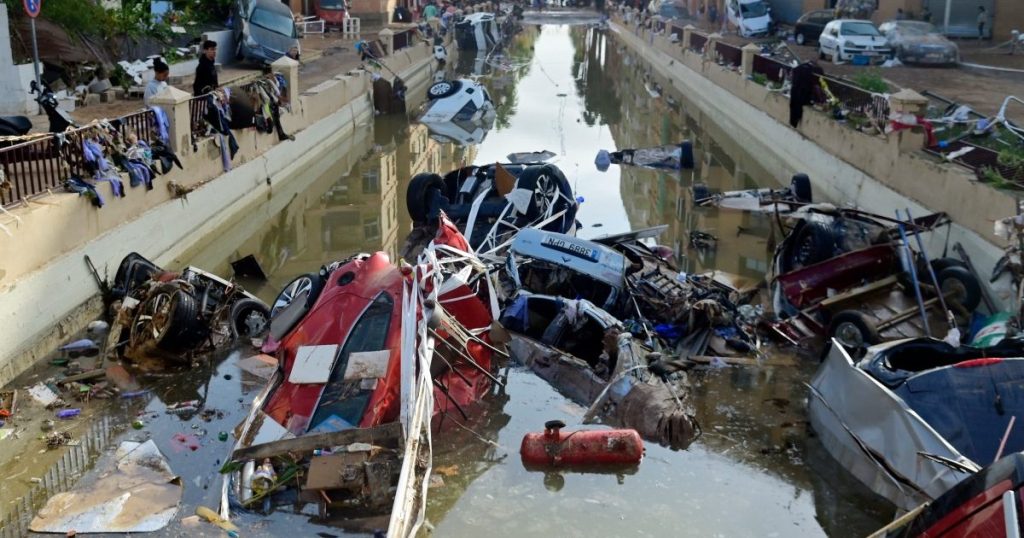The devastating floods that ravaged Spain’s Valencia region on October 29, 2023, serve as a stark reminder of the escalating threat of climate change and its potential to unleash catastrophic natural disasters. The floods, which claimed the lives of 236 individuals and decimated critical infrastructure, stand as the deadliest such event in decades, prompting a national reckoning with the realities of a rapidly changing climate. To honor the victims and acknowledge the profound impact of the tragedy, the Spanish government will hold a state funeral on the one-year anniversary of the floods at the City of Arts and Sciences complex in Valencia. This solemn ceremony will serve as a moment of national reflection and remembrance, recognizing the immense loss suffered by the affected communities and the nation as a whole.
The sheer scale of destruction wrought by the floods ignited a wave of public outrage, directed primarily at the perceived failures of both the national and regional governments in managing the disaster. Accusations of inadequate preparedness, delayed response, and insufficient resources fueled a politically charged blame game between the opposing political factions. The ensuing controversy underscored the complex interplay between natural disasters, political accountability, and the challenges of adapting to the increasing frequency and intensity of extreme weather events. The floods exposed vulnerabilities in Spain’s disaster management systems and highlighted the urgent need for improved coordination and resource allocation to mitigate the impacts of future climate-related crises.
Scientific evidence strongly supports the conclusion that human-induced climate change is exacerbating extreme weather phenomena, including the torrential rainfall that precipitated the devastating floods. The warming of the planet, driven largely by the release of greenhouse gases from human activities, intensifies the hydrological cycle, leading to more frequent and intense precipitation events. The Mediterranean Sea, experiencing rapid warming, played a significant role in fueling the disaster. Warmer sea surface temperatures contribute to increased evaporation rates, providing more moisture to fuel intense rainfall. This confluence of factors – human-driven climate change, a warming Mediterranean, and torrential downpours – created a perfect storm, resulting in the unprecedented devastation witnessed in Valencia.
The Mediterranean Sea, a critical component of the region’s climate system, has become a focal point in the climate change discussion. Acting as a massive heat sink, the Mediterranean has absorbed a staggering 90% of the excess heat generated by human activities since the beginning of the industrial revolution. This absorption of heat has led to significant warming of the sea surface, with far-reaching consequences for regional weather patterns. The increased sea surface temperatures contribute to more intense evaporation, providing ample moisture for the formation of powerful storms. Furthermore, the warming Mediterranean influences atmospheric circulation patterns, potentially altering the trajectory and intensity of storms. This complex interplay between the warming sea and the atmosphere underscores the interconnectedness of climate systems and the cascading effects of human-induced climate change.
In the wake of the floods and a summer marred by record-breaking wildfires, Spanish Prime Minister Pedro Sanchez has called for a national pact against climate change. Recognizing the urgency of the situation, Sanchez emphasized the need for a unified national response to address the escalating climate crisis. The proposed pact aims to bring together various stakeholders – government agencies, businesses, civil society organizations, and citizens – to collaborate on implementing effective climate mitigation and adaptation strategies. Sanchez has highlighted the growing evidence of climate change’s impact on Spain, citing both the devastating floods and the unprecedented wildfires as clear indicators of the accelerating climate emergency. He stressed the importance of collective action to mitigate the risks and build resilience to the increasingly frequent and severe climate-related events facing the Iberian Peninsula.
The proposed national pact against climate change represents a crucial step toward a more sustainable and climate-resilient future for Spain. The pact seeks to foster a collaborative approach to climate action, recognizing that addressing this complex challenge requires the coordinated efforts of all segments of society. Key elements of the pact likely include ambitious targets for reducing greenhouse gas emissions, transitioning to renewable energy sources, investing in climate adaptation measures, promoting sustainable land management practices, and raising public awareness about climate change. The success of the pact will depend on the commitment and collaboration of all stakeholders, working together to build a more sustainable and resilient Spain, capable of withstanding the challenges of a changing climate. The devastating floods of 2023 serve as a stark reminder of the urgency of this task, highlighting the need for immediate and decisive action to mitigate the risks and protect future generations.














